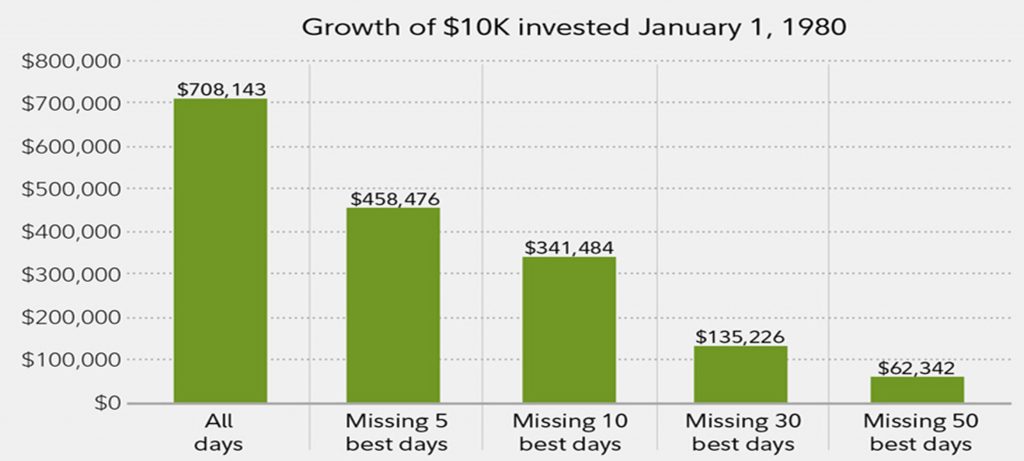Volatility….. Don’t Panic! Don’t Panic!

The key message for those worried is simple – don’t panic. While it is not always easy to predict just how the market will react to political and economic triggers, merely acknowledging that volatility plays a natural role in determining the price of different assets is an important step to take.
“The true investor welcomes volatility … a wildly fluctuating market means that irrationally low prices will periodically be attached to solid businesses.”
Warren Buffet
Read on to fully understand why market volatility is a normal part of the economic cycle
The stock market can be a highly volatile place, with wide-ranging annual, quarterly, even daily swings in the markets. Although this volatility can present significant investment risk, when correctly harnessed, it can also generate solid returns for shrewd investors. Even when markets are choppy, crash, or surge, there can be opportunity.
Volatility is most traditionally measured using the standard deviation, which indicates how tightly the price of a stock is clustered around the mean or moving average.
Larger standard deviations point to higher dispersions of returns as well as greater investment risk.
Keep Calm
Many people think they can remain rational when markets are volatile and when investment values are going through a dip. The truth, however, is quite the opposite. People become overly emotional when markets behave badly to the point of selling off valuable stakes of their portfolio.
However, if you are not comfortable with your current portfolio mix, you should not have a knee-jerk reaction to the current downturn. Changing your risk profile in reaction to the change in the market’s circumstances is akin to timing the market. You may want to lower your risk threshold after experiencing losses, or raise your risk tolerance in a rising market, but you must avoid falling prey to your emotions.
Such decisions should be based on a thorough reassessment of your risk profile and selling shares when values decline is never a good idea.
(you can learn more about risk profiling HERE)
Timing the Market
Trying to jump in and out of the market to obtain the best returns is a dangerous game and in fact you may end up missing the markets best days if you try that strategy.
The below graph shows what Fidelity found when they crunched the numbers on what would happen to a hypothetical $10,000 investment into an S&P 500 index fund from 1980 to 2018 if you missed the best five market days.
Missing the five best days when you’re otherwise fully invested drops your overall return by 35%! And the results only get worse the more good market days you miss. Missing the best 10 days will more than halve your long-term returns.
Market volatility can actually present an opportunity to invest in assets with greatly discounted prices and this is very beneficial if you are investing on a regular basis where you can use the power of pound cost averaging.
So, how can you keep from panicking when market volatility shows up on the horizon?
For starters, it’s important to understand that any asset you choose comes with volatility. Every market will always have its ups and downs, and there’s no use trying to predict every step it will make. So, when investing, consider basing your decisions on your timeline and tolerance for risk, rather than on small fluctuations happening in the markets from day to day.
Diversify
Also, remember that staying diversified is one way to help reduce your exposure to volatility. By spreading your money out over various asset classes you’re also spreading out your risks, as well as ensuring your portfolio’s results aren’t based on the performance of a single investment.
“A pessimist sees the difficulty in every opportunity. An optimist sees the opportunity in every difficulty”
Winston Churchill
Key Takeaways
- Invest consistently, even during the bad times.
- Consistent investing can give you the opportunity to buy stocks when they are at their cheapest.
- Some of the best times to buy stocks have been when things seemed the worst.
- History has proven that panic-selling for long-term investors almost always ends poorly.
- Theoretically speaking, if you are a long-term investor, you shouldn’t be concerned as much since volatility is less influential over a longer time.
It is very important to note that investors who kept their wits during a financial slump ended up recouping not only all their losses but were also still around to benefit from a market recovery.
If you are worried over the current market volatility and would like to discuss your portfolio you can take advantage of my free 60-minute consultation by clicking the Contact Me Today for an initial informal chat.
I would be happy to review your current financial plan, offer some tips for creating one or answer any questions you might have pertaining to your investments.
About the author
Colin MacGregor is an independent financial advisor with over 10 years experience in the advisory sector and has been based in Prague, Czech Republic since 2009.


0 Comments